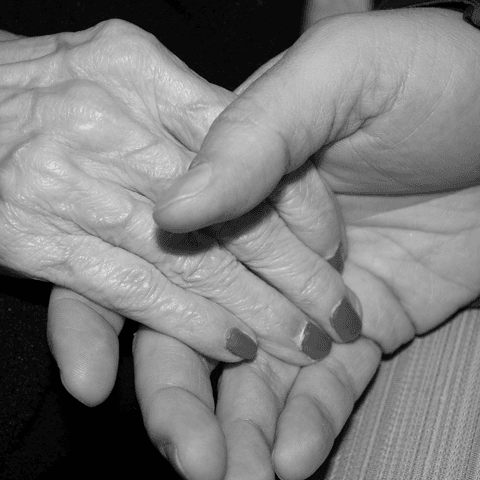
Missing the Hand You Hold: Ambiguous Loss In Dementia Care
Our grief as caregivers can be so overwhelming. We may question ourselves “each day it feels like I am in persistent mourning, yet no death has occurred. I have lost loved ones to death before, so why now are my feelings as a dementia care partner so overwhelming?” Each day we may feel as if we are on a carousel of emotions - grief, loss, sadness, anger, joy, acceptance; a mixture of hope and despair, round and round we go.
The answers to our questions may be best understood from the clinical work of Pauline Boss on ambiguous loss and unresolved grief. Ambiguous loss is defined as loss without closure, without resolution. Ambiguous loss has no predictable ending nor clear guidelines. Rather the losses are vague and uncertain. Ambiguous loss is unlike any other type of grief because it is not a loss that is acknowledged and collectively grieved.
There are two types of ambiguous loss. The first type of ambiguous loss is the grief for someone who is physically absent but emotionally present, such as prisoners of war, soldiers, or kidnap victims. The type of ambiguous loss which particularly relates to dementia is defined as grief for someone who is physically present, but cognitively and emotionally absent. The person with dementia has altered thinking and personality. The person we care for that has dementia may not be the same as they were prior to the disease process. Is our person absent or present? The more uncertain we are whether the person we care for is absent or present the greater our risk of depression and the more intense are our feelings of mourning.
The nature of ambiguous loss related to dementia in personal relationships can be most devastating because the loss remains unclear. Is the person absent or present? There or not there? There is no wake, no funeral, no casseroles appearing at our door when our person cannot recall our name or the names of our children. It is a private loss that we navigate on our own, often feeling alone and confused.
Ambiguous loss can freeze our grief process, blocking our movement forward. We are neurologically wired to seek clarity, predictability, and consistency in our close relationships. Due to the nature of ambiguous loss, we may feel uncertain or indecisive about a course of action or the management of a situation. The ambiguity of our loss makes it difficult to master. We cannot master what we do not know. We may freeze, be unable or unwilling to reorganize our lives due to the uncertainty of the loss. Do we move forward and adapt to a new normal? If we move forward and accept the absence, do we lose the parts of our loved one that are still present? How do we navigate this new relationship with someone who is physically present but cognitively and emotionally absent?
We must recognize the psychological impact of the ambiguous loss which accompanies our walk with our care person on this journey with dementia in order to begin to manage our unresolved grief. We can begin to master that which we can understand. We move to the acceptance of the situation, the ambiguity of the loss, the ebb and flow of the disease process, the “here but not here”, holding simultaneously the absence and the presence of the person, as we move to finding our middle ground. We hold tight to the knowledge that the symptoms are not the person. We celebrate the parts of the loved one that are present and let go of the parts lost. We redefine our relationship and we recognize our feelings of both hope and hopelessness, joy, and sadness, as we ride this carousel of emotions on our caregiving journey.
Author
Rebecca C. Harrison, LCSW, CDP is a Licensed Clinical Social Worker offering therapy to individuals, couples and families with a practice focus on dementia and dementia caregivers.
Blog
"I like that IMCC focuses on dementia-related problems and provides a focal point for families to network and socially interact in coping with dementia. It provides a community that helps us in our struggle."







